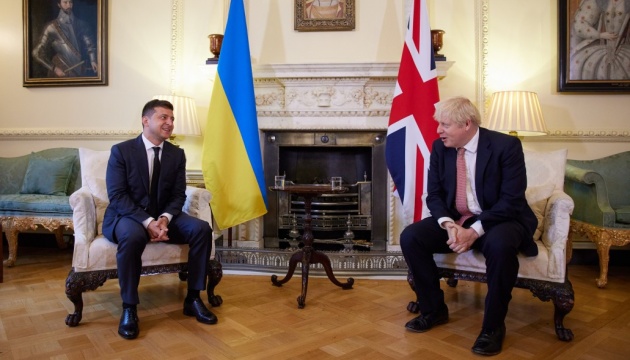
Ukraine’s Geopolitical Successes Become Russian Defeats
Publication: Eurasia Daily Monitor Volume: 17 Issue: 153
By:

In the first half of October, the Ukrainian leadership concluded a series of important international agreements, with significance not only for Kyiv itself but also for buttressing regional security more broadly. First, during Ukrainian President Volodymyr Zelenskyy’s October 7–8 visit to London, Ukraine’s Minister of Defense Andrey Taran and State Secretary for Defense of Great Britain and Northern Ireland Ben Wallace signed a memorandum on strengthening cooperation in the military and military-technical spheres (President.gov.ua, October 7). Reportedly, the deal will cover production of missile patrol boats for the Ukrainian Armed Forces that will be compatible with North Atlantic Treaty Organization (NATO) standards (Pravda.com.ua, October 7). Additionally, President Zelenskyy and British Prime Minister Boris Johnson signed an agreement on political cooperation, free trade and strategic partnership between Ukraine and the United Kingdom (President.gov.ua, October 8).
Second, on October 12, during a meeting with Polish President Andrzej Duda in Kyiv, the Ukrainian side agreed to intensify cooperation with the Three Seas Initiative, including in the energy sphere. This closer collaboration aims to strengthen energy self-sufficiency in the region and Europe more generally (Racurs.ua, October 12).
No less important was the summit two days later between Zelenskyy and his Turkish counterpart, President Recep Tayyip Erdoğan, which resulted in a framework agreement on defense concluded between the Ukrainian Ministry of Defense and the State Agency for the Defense Industries of Turkey. According to official information, the document defines the directions and principles of bilateral defense cooperation as well as the security regime covering classified information and intelligence sharing. Additionally, the parties signed a Memorandum of Intent in the field of long-term cooperation between the aforementioned departments and on the creation of joint defense-industrial projects, namely, the construction of warships, unmanned aerial vehicles (UAV) and various types of turbine engines (President.gov.ua, October 16).
As noted by the media, the signed agreements mean that Kyiv and Ankara are strengthening cooperation at the level of special services, armed forces and the military-industrial complex in the Black Sea and maybe beyond. Moreover, bilateral cooperation is anticipated in the development of joint weapons and the production of Turkish Bayraktar TB2 drones in Ukraine. In general, some Ukrainian analysts posit, the results of recent weeks point to the emergence of the contours of a new transregional defense alliance that includes Ukraine, Azerbaijan, the UK, Turkey and Poland (Dsnews.ua, October 19).
Russian experts have already termed the rapprochement between Ukraine and Turkey a “challenge” for Moscow. In their opinion, the possible “presence of Turkish drones in Ukraine is fraught with unpleasant consequences”: if they appear in Donbas, the Russian-controlled regimes of the Donetsk and Luhansk “people’s republics” (DPR, LPR) will have nothing comparable to oppose them. Furthermore, Russian experts are worried about Turkey’s support for the Crimean Tatar diaspora and the prospect of a joint Ukrainian-Turkish naval formation in the Black Sea (Gazeta.ru, October 14).
Russo-Turkish relations have become noticeably strained of late. This may be seen in Ankara’s unconditional support of Azerbaijan in the latter’s war against Armenia in Karabakh; in the consistent Turkish policy of promoting its interests in the region; and in Turkey’s continually decreasing energy dependence on Russia. This year, the largest Turkish oil refinery, STAR, sharply reduced its purchases of Russian oil, switching to imports from Iraq and Norway (Neftegaz.ru, September 28). Months earlier, Azerbaijan replaced Russia as Turkey’s largest source of natural gas (see EDM, July 6). Azerbaijan presently makes up about 24 percent of the share of gas imports to Turkey; and though a couple years ago Russia owned a third of this import market, it has since fallen to fifth place (9.9 percent). It delivered 41 percent less gas in the first half of 2020 than during the same period in 2019 (Politnavigator.net, September 30). Also, Turkey has discovered new reserves of natural gas in the Black Sea, which will further reduce its need for fuel imports from Russia (see EDM, October 1). This could lead to underutilization of the newly launched TurkStream gas pipeline. The previous Blue Stream pipeline has been shut down since the spring, presumably because Turkey does not need so much Russian gas (Nezavisimaya Gazeta, October 18).
The next step is completion of the construction of the Trans-Adriatic Pipeline, part of the Southern Gas Corridor and designed to become an alternative route for natural gas supplies to Europe. This network of pipelines will send gas from the Azerbaijani offshore Shah Deniz field, bypassing Russia, through Turkey and Greece to Southeastern Europe (Nangs.org, October 14).
Moscow is left with fewer and fewer opportunities to resort to oil and gas blackmail in pursuit of its foreign policy interests; as other countries’ dependence on Russian energy continue to dwindle, so does Russia’s ability to dictate its own terms in the region. Russian observers already acknowledge that Russia has little or no leverage to stem the rise of Turkey and prevent the creation of new defense alliances along their country’s borders (T.me/russica2, October 17). The further extension of these trends promises to significantly change the balance of power in the Black Sea region and the South Caucasus.



